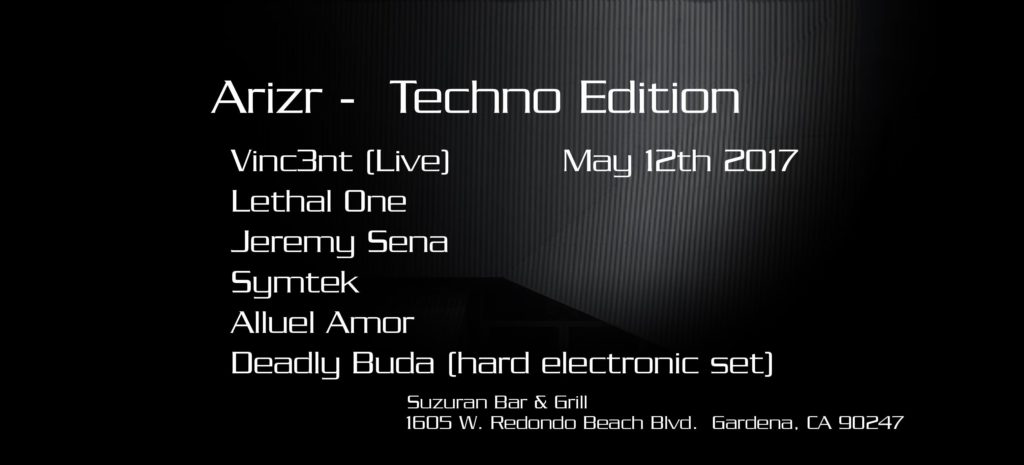“Hard Electronic” is an umbrella musical term that encompasses several electronic dance music genres and sub-genres generated since the early 1990’s from the “rave” subculture of music. In general, the word “hard” refers to a darker, distorted soundscape, and, or, a soundscape which is initially “hard to listen to”, “baroque”, abstract, or complicated. Examples of EDM subgenres classified within “Hard Electronic” are: hardcore techno, drum and bass, hardstyle, rawstyle, psytrance, jungle, crossbreed, Detroit Techno, acid techno, splittercore, speedcore, intelligent dance music, tekno, hard trance, happy hardcore, trance, hard trap, trap and breakcore, though there are many more.
The term “hard electronic” was coined by Lenny Dee, owner of Industrial Strength Records and a pioneer in hardcore techno, hard techno, and other early rave music. His feeling was that an umbrella term was needed to encompass all the stylistic derivations that emerged from hardcore techno, (for example: gabber, happy hardcore, breakcore, and trance), while simultaneously recognizing the “hardcore” variations predominant in the UK in the early 90’s and their offspring. For example: hardcore breakbeat, jungle, drum and bass, grime, speed garage and dubstep.
In 2015, Industrial Strength Records started a sub-label called “Hard Electronic” featuring music that was in the 128-150 beats-per-minute range, and sounding much like a heavily distorted re-thinking of the techno-trance genres, occasionally punctuated by sound effects reminiscent of early rave music. In essence, it seems that the earliest ideation of the label was to reclaim the lower bpm-ranges previously abandoned by the various hard electronic sub-genres. The label has yet to be widely promoted but its output thus far occupies an interesting space in the overall electronic dance music market.

As a DJ that routinely plays hardcore techno and hardstyle, the bpm range in my performances range from about 150-230 bpm. In general, only the young or young-at-heart, literally, can keep up with these speeds. The market is such that I am generally only booked to play these speeds. I don’t really mind, of course, but one thing I believe missing from the current EDM/rave market is the idea of the “build-up.” This may sound strange, as plenty of modern EDM tracks contain “build-ups” and “drops” within their composition. What I mean is a more natural musical build-up through the course of a night. In the glory days of the early rave scene, a rave’s dj line-up was generally programmed so that the music started slow, got faster, reached a peak, and then slowed back down towards the end of the night.
As the various rave sub-genres splintered, they each seemed to occupy definite BPM ranges that were quite tight and unchanging. The problem with this is that the crowd never seems to get properly “warmed up.” The faster hardcore techno suffered the most from this I believe, because in the older paradigm people knew to save their energy for the peak, and a mainstream audience could be comfortably introduced to the faster speeds at the same time.
The music on the “Hard Electronic” label, while only occupying a sliver of the overall soundscape encompassed in the term “hard electronic” brings some valuable tools to the hard electronic DJ’s tool kit. Because the music is slower, it can be more easily embraced by an older audience. It is easier to dance to for any age, really, and could easily be at home in a club playing traditional techno, trance or house music. For the “hardcore” crowd who demands a darker and more abstract soundscape in general, the HE tracks provide a nice warm-up to the night, and expand the sonic palette for artist and dancer alike, while clearly drawing a path to the more extreme music on the horizon, if desired.
At the Trauma One-Year Anniversary party in Los Angeles, I opened a 2 hour set with one hour of tracks from the H.E. label. The crowd reaction was one of extreme curiosity from young and old alike. A few people came up on stage to see the playlist, though one or two hard-heads were taken aback by the slower speeds. Nonetheless, the tracks bridged great as I eventually sped up to about 175 beats-per-minute in the second hour and had the crowd bouncing off the walls. There was a tangible sense of comfort the crowd had that had long been missing from hardcore shows. Basically the idea of “warming the crowd up” seemed to eventually effect a really nice atmosphere for the rest of the night. Granted, the hardcore crowd won’t remember any fireworks from this part of your show necessarily, but you’re laying out a great foundation for the rest of your night. For an older or more mainstream crowd however, some of the H.E. tracks might be considered real “bangers” and bring some fresh sounds to the night whilst still maintaining a club’s overall musical parameters.
So without further ado, here is a mix of Hard Electronic (the label) tracks I spun at ARIZR! a couple months ago. Enjoy!
Also, Friday, May 12, 2017 I’m going to warm up the crowd with a little hard electronic at the Techno Edition of ARIZR! Be There!
https://www.facebook.com/events/103712070171431/
And finally, some of my favorite tracks from Hard Electronic…






Love this! Take a look at our article describing all the different edm genres because we listed hard dance as one of our favorites! https://glofx.com/rage-blog/top-10-edm-genres-and-subgenres/